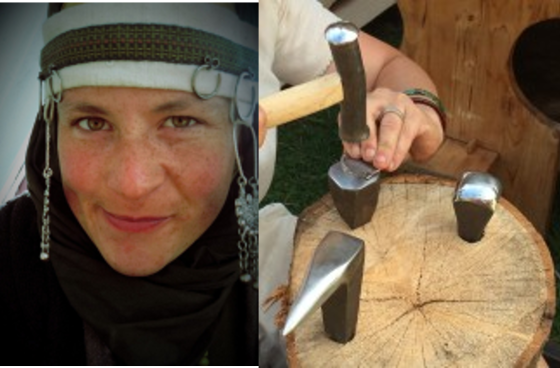Workshop: Making Temple Rings
Kind of Event
- Workshop
Country
- Germany
The fashion for temple rings probably came to Central Europe from southeastern Europe during the migration period. Various forms of rings, which were worn in the hair or on headgear, were among the indispensable fashion accessories of the Alemanni or Frankish women of the world. It wasn't until the 8th century that they went out of fashion in Central Europe. In contrast, they remained a popular classic among Baltic tribes right up to the 12th century, especially in the eastern Baltic region. They were also always popular in the Byzantine Empire.
But as it is with fashions: they all come back at some point! From the 11th century onwards, temple rings took off again among West Slavic tribes in Central Europe and were once again part of sophisticated headdresses in eastern Holstein. A wide variety of forms made of bronze and silver were also found here. Simple examples were simply bent from wire, others were elaborately made from sheet metal and decorated, including examples with pendants or elaborate decorative surfaces.
In our workshop we will focus on the somewhat simpler examples of this form of jewelry. So that it doesn't become too easy, we also leave the specimens that are just bent into large rings out of wire. (Otherwise the workshop would be over after 10 minutes. ;-)
In the workshop, so-called s-shaped temple rings are made from bronze or copper. For this purpose, basic techniques such as metal driving, bending and filing are learned and applied. Of course, the whole thing has to be polished to a high shine so that no one has to hide with this jewelry.
It is also possible to make small ring brooches during the workshop. These are still practical today so that you don't have to chase scarves or neckerchiefs in windy weather, for example.
Since no one wants to stress at the weekend, we hold our workshop in the usual relaxed atmosphere with a cup of coffee or tea. The crafting itself offers plenty of opportunity for a nice chat with the course leader and the other participants.
Due to limited number of participants, we ask that you register in advance.
Date: Saturday, November 18th, 2023, 2 p.m. - 5 p.m
Location: Seminar room in the reception building of the Wallmuseum
Course fee: €10 / person (including basic materials and meals)

